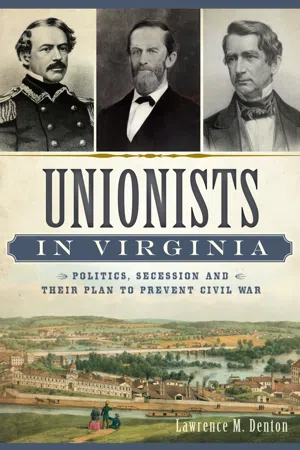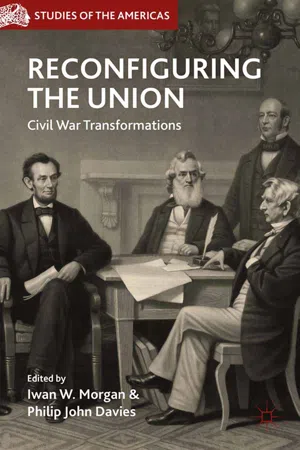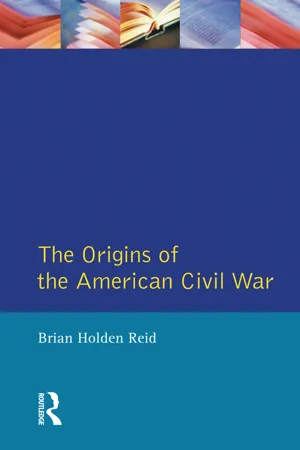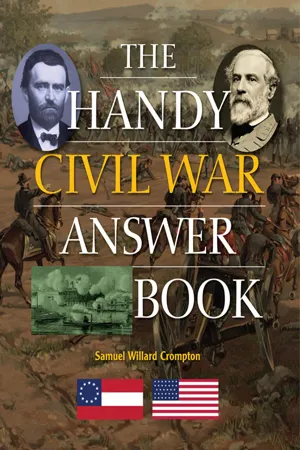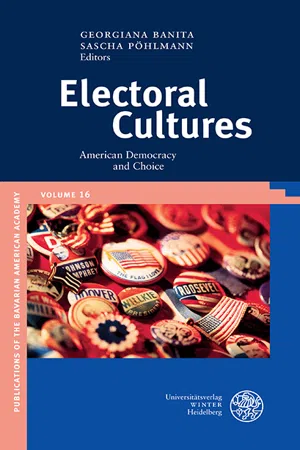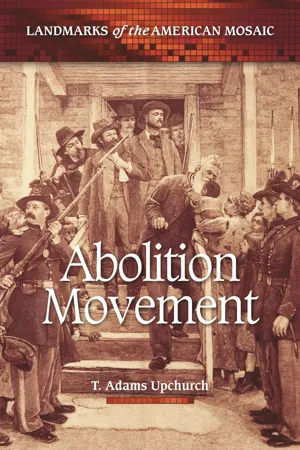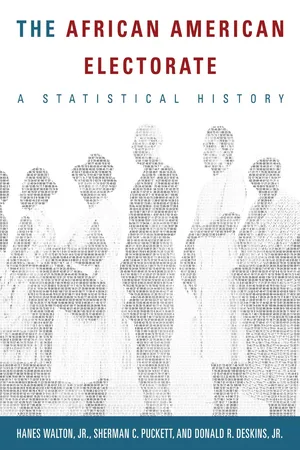History
1860 Presidential Election
The Presidential Election of 1860 was a pivotal event in American history, leading to the election of Abraham Lincoln as the 16th President of the United States. The election highlighted the deep divisions over slavery, ultimately contributing to the outbreak of the Civil War. Lincoln's victory as a Republican candidate further exacerbated tensions between the North and South, ultimately leading to secession and the formation of the Confederacy.
Written by Perlego with AI-assistance
Related key terms
1 of 5
8 Key excerpts on "1860 Presidential Election"
- eBook - ePub
Unionists in Virginia
Politics, Secession and Their Plan to Prevent Civil War
- Lawrence M. Denton(Author)
- 2014(Publication Date)
- The History Press(Publisher)
CHAPTER 2 THE PRESIDENTIAL ELECTION OF 1860Sorting northerners and southerners into mutually distinct pigeonholes runs the risk of imposing an arbitrary order on a messy irrational tragedy.—Daniel W. Crofts, Old SouthamptonDuring the nineteenth century, Virginians voted in dozens of elections—from presidential and gubernatorial elections to elections for constitutional conventions and special elections of one kind or another. Two of these elections—the presidential election of 1860, held on Tuesday, November 6, and the election for delegates to the Virginia State Convention, held on Monday, February 4, 1861—had the potential to position the state to play a key role in averting civil war. The presidential election, despite enflamed rhetoric and unfamiliar prospects caused by a four-way race, followed normal voting patterns for the most part. But it was the other election that would prove so portentous. The election for delegates to the Virginia State Convention was simply a monumental happening—it was an explosive turnabout for Virginia’s electorate whereby previous party loyalty was discarded and a new political entity took shape. Like the phoenix rising out of the ashes, it was the most dramatic political realignment in the state’s history. The election of 1860 will be analyzed here and the election of 1861 in Chapter 3 .First, a look at the role Southern Republicans played at the Republican National Convention, held in Chicago from May 16 to 18, 1860, to nominate a president and vice president and adopt a party platform for the upcoming presidential election in November. As the representatives of this new political party (this was only the second time the party would field a national ticket) gathered at the Wigwam, the structure built to house the convention in Chicago, it was a foregone conclusion who the party nominee would be. While a half dozen men had thrown their hats in the ring, most as favorite-son candidates from a given state, it was William Henry Seward whom most delegates felt would secure the nomination on the very first ballot. - eBook - ePub
Reconfiguring the Union
Civil War Transformations
- I. Morgan, P. Davies, I. Morgan, P. Davies(Authors)
- 2013(Publication Date)
- Palgrave Macmillan(Publisher)
Chapter 5 The Military Significance of the 1864 Presidential Election Brian Holden ReidIn the 150th anniversary year of the Civil War, the popular interest in its military history continues unabated, although there are signs that it has been overtaken by World War II and Vietnam as the buffs’ favorite war. Even academic historians are prepared to accept that the military direction of the war should be understood and discussed, though it is often tucked away and wrapped in euphemism. Unlike in 1961–1965, the 150th anniversary has focused far less on the enduring controversies surrounding the conduct of the war and rather more on its coming. Such debates have clearly fed off the rise of the Tea Party in American politics that has featured fevered discussion of “states’ rights,” and the “tyranny” of the federal government. They also anachronistically assume that the issues that provoke disquiet in the second decade of the twenty-first century were similar to those of the 1850s. One way of avoiding unwanted dissension has been to focus on the individual experience of the war; another has been to close eyes: Whenever it is mentioned, the refrain that the Civil War is “the war we want to forget” has underwritten some reluctant commemorative efforts. Alas, the world we live in, shaped by this and so many other great wars, does not permit selective, escapist amnesia.1It is assumed throughout this chapter that military events in 1864 were of primary importance, the pivot around which swiveled all other events of that momentous year. Such an assertion of the fundamental and correct relationship between military, political, social, and economic forces inherent in war and statecraft, indeed the very organization of nation states, is equally applicable to conflict within states. If we turn to the essential text that explains the complex relationship between war and social forces, On War , German–Prussian military theorist Carl von Clausewitz dwells on what he terms a “paradoxical trinity” that governs its development, “enmity, chance and reason.” His central argument rests on what he calls war’s “unity”: “the concept that war is only a branch of political activity; that it is in no sense autonomous” - eBook - ePub
- Brian Holden Reid(Author)
- 2014(Publication Date)
- Routledge(Publisher)
CHAPTER SIXThe Year of Decision: 1860
So even if he couldn’t anticipate no war to save him, back in his mind somewhere he was still confident that Providence would furnish something.WILLIAM FAULKNER , The Mansion 1In 1860 the United States submitted itself once more to what Nathaniel Hawthorne in his novel The Scarlet Letter called the ‘periodic terrors of a Presidential Election’.2 The intricate process of nominating and electing a presidential candidate was undertaken in the darkening atmosphere of increasingly hysterical threats of southern secession should a Republican candidate win a majority of votes in the electoral college. In previous years presidential elections had served to defer decisions; in 1860 something was actually decided. The electoral process offered up a decision despite itself, and the result was civil war. The campaign witnessed the disintegration of the Democratic Party. No fewer than four candidates energetically sought to gain entrance to the White House. Indeed, it was a measure of the perceived crisis facing the United States that one candidate even dispensed with tradition and energetically campaigned on his own behalf on the campaign trail. The destruction of the second party system, which had been dominated by the Democratic Party, provided the occasion for the process of disunion that followed the Republican victory at the polls in 1860. This is a complex process, and it is not sufficient to say that the disruption of the party mechanism inevitably led to civil war. Nonetheless, in a political structure as rigidly geared to the workings of the calendar as that laid down by the United States Constitution, and whose parts are so intermeshed with one another in a complicated series of continuing elections at various levels, it was very likely that disruption of one part would lead to ructions, violence and even anarchy in all the others.This chapter offers a case-study of a presidential election. It is essential that the inchoate nature of American politics be understood. It was characterized by ceaseless competition, bargaining, manoeuvring and intriguing, and offered ample scope for the pursuit of ambition. It is pointless to condemn the system because it was the embodiment of an open, democratic society – though it was hardly without its weaknesses and disadvantages. The coming of civil war was a reflection of its flaws. The political system was also so variegated that it made the imposition of any compromise solution almost impossible; any attempt could be effectively opposed by those so minded. This should not be surprising because the American political system is designed to breed tension, competition and conflict. If the South had been protected by the conservatism of American political culture before 1850, then after 1860 it was threatened by a new consensus that was less inclined to settle on southern terms. - eBook - ePub
- Samuel Willard Crompton(Author)
- 2014(Publication Date)
- Visible Ink Press(Publisher)
Lincoln lost New York City (it was not yet divided into separate boroughs) by 33,290 to 62,293 for Stephen Douglas, but he won the all-important Empire State by 362,646 to 312,510. Months later, when he visited Manhattan, Lincoln joked that he was not the first choice of its people. Lincoln won the Keystone State of Pennsylvania by 270,170 to 176,435 for the so-called Fusion Ticket. Douglas won only 17,350 votes, and the Constitutional Union Party picked up 12,755. Lincoln took all the New England states and all the Western ones, save Indiana. On the West Coast, he took California by the relatively narrow margin of 38,646 to 37,349 for Douglas. John Breckinridge and the Southern Democrats did much better than anticipated in the Golden State, coming in third with 33,357. The story was quite different in the South, however.How did the election map look in the Southern states?
It was almost as if there was no Lincoln and no Republican Party. Ten Southern states kept Lincoln and the Republicans entirely off the ballot, and Virginia granted Lincoln a total of 1,929 votes (for comparison, John Bell won with 74,584 and John Breckinridge came in a close second with 74,335). The candidate who suffered the most was Stephen A. Douglas. Nationwide, he came in second with over a million votes, but in state after state and section after section, he was squeezed out. Douglas won only the state of Missouri (by a narrow margin) and the Garden State of New Jersey, where he split the electoral vote with Lincoln.This map shows the results of the 1860 Presidential Election and the electoral votes received by the four candidates.How does Lincoln’s 1860 election stack up when compared to other major election races?E ver since George Washington made a clean sweep of the electoral vote in 1789, Americans have looked for clear-cut winners. But once the popular votes were counted and made public, there have been a whole number of close and contested elections.Lincoln did not have a majority election decision, as did Andrew Jackson in 1828 and 1832, and he did not clean up on his opponents as Franklin Roosevelt did in 1932, 1936, 1940, and 1944. But his margin of victory was far larger than that of John F. Kennedy in 1960, and his Electoral College victory was better than that of Bill Clinton in 1992. Then, too, those who criticized Lincoln for being a minority president ignored the simple fact that Lincoln did more with his slender margin of victory than almost any other president of any century. - No longer available |Learn more
Electoral Cultures
American Democracy and Choice
- Georgiana Banita, Sascha Pöhlmann(Authors)
- 2015(Publication Date)
- Universitätsverlag Winter(Publisher)
The government structure that was set up was more republican than democratic. It was a government of the “most virtu-ous,” i.e. educated and wealthy white men rather than of the populace as a whole (Mayo 78). Poor white men, women, slaves, and blacks were excluded from the franchise. The first half of the nineteenth century saw not only an increasingly fierce debate about slavery, but also a gradual expansion of democratic participa-tory rights. By the mid-nineteenth century, the franchise included almost all white men. That changed the popular debate about slavery as well. No longer would a small group of elite members of society be able to determine the course of the country as a whole. The issue of slavery would, from then on, be debated openly in Congress and by candidates during election campaigns. The candidates’ primary interest in those debates was to win the election. This has to be kept in mind when analyzing their campaign statements. Lincoln, Slavery, and Elections Abraham Lincoln was a typical example of a politician of the generation after the founding fathers. John Adams, Thomas Jefferson, James Madison and the other leading politicians of the late eighteenth century grew up in comfortable surround-ings on the East Coast. They enjoyed an education based on European ideals. They were well versed in enlightened ideas and theories about the state. Lincoln, in con-trast, was born in utter poverty in Kentucky and grew up along the frontier in Illi-nois. He received almost no formal education. Nevertheless, he was a voracious 4 The fact that the secession movement began immediately after Lincoln’s election has often been interpreted to mean that contemporaries considered him an abolitionist. That was not the case. Lincoln was elected solely on the basis of Northern votes. He did not get a single elec-toral vote in any of the seceding states. - eBook - PDF
- T. Adams Upchurch(Author)
- 2011(Publication Date)
- Greenwood(Publisher)
Some got entangled in political and financial corruption that ended their careers, and others were replaced in regular elections by constituents who did not appreciate the continued focus on racial issues. Some died before they had to worry about reelection or retirement. The years 1865 through 1868 proved hard for the former slaves. President Andrew Johnson, a southern Democrat who took over upon the death of Lincoln, had opposed slavery and approved of emancipa- tion but thereafter showed little concern for the welfare of the free black population. Constitutionally conservative, he conflicted with the “big government” Republicans who controlled Congress and who sat in the Cabinet he inherited from Lincoln. Notably, he opposed the 14th Amendment that made blacks U.S. citizens and the Civil Rights Toward the Civil War 97 Act of 1866 that gave them the same legal rights that whites enjoyed. Ultimately, the two sides would clash in an ugly impeachment episode over these issues (although Republicans cited technical, legal reasons for the impeachment). Meanwhile, the southern states attempted to handle their free black populations in their own ways, which were totally different from the northern Republican vision for a postslavery nation. The result was a clash between the states and the federal government that resulted in the creation and dissolution of the Ku Klux Klan and military occupation of the South. In 1869, the situation took an apparent major turn for the better when the northern Republican Ulysses S. Grant was elected president. Much friendlier toward blacks, he worked with Congress rather than against it to ensure that the 14th Amendment was enforced and the 15th Amendment guaranteeing black voting rights was passed and enforced. - eBook - PDF
The African American Electorate
A Statistical History
- Hanes Walton, Sherman C. Puckett, Donald R. Deskins(Authors)
- 2012(Publication Date)
- CQ Press(Publisher)
Before the election took place, Lincoln dismissed Secretary of Treasury Salmon P. Chase. Ever ambitious, Chase combined with the editor of the New York Tribune newspaper, Horace Greeley, and began a drumbeat that President Lincoln could not possibly win reelection. Eventually, they were joined by a number of other well-known Republicans like Senator Charles Sumner of Massachusetts. Said group of party elites publicly asked Lincoln to resign in order to save the party, and they suggested a number of replacement candidates. But the change in the party’s fortunes with Union victories led them to drop their efforts and to rejoin the party with a vengeance. The healing of the second split main-tained the Republican Party advantage. Yet the Republicans did not stop with these two strategies to win the 1864 presidential election. They sought and got Nevada, which had a strong Republican majority, admitted to the Union as a free state. Finally, they added the Union soldiers. Here, the Democrats had effectively shot themselves in the foot because they were asking soldiers to vote for a presidential candidate who had declared the war a failure, and by November the Union was now literally winning the war. The end result was President Lin-coln’s winning twenty-two of the twenty-five states in the Union. He only lost Delaware, Kentucky, and Democratic nominee McClellan’s home state of New Jersey. Lincoln’s victory suppos-edly included some 80% of the soldiers’ vote. In sum, during the 1864 presidential election, the Democrats developed several electoral and political strategies that further disadvantaged them beyond not being the incumbent party in this election, while the Republicans enhanced and enriched their political advantages beyond their being the incumbent party. One of the contextual variables that worked for them in this election was the soldiers’ vote. We are now ready to explore whether Afri-can American soldiers voted in this election and, if so, for whom. - eBook - ePub
- Alice Fahs, Joan Waugh, Alice Fahs, Joan Waugh(Authors)
- 2005(Publication Date)
- The University of North Carolina Press(Publisher)
The GOP’s restructuring of Civil War memory to include the dangers of class division was especially concentrated in the key electoral battleground states of the Midwest: Illinois, Indiana, Michigan, Wisconsin, and Ireland’s home state of Minnesota. The Midwest had seen some of the most violent labor strife of the 1890s. This region also was home to one of the largest concentrations of Union veterans in the nation, a key GOP constituency. By stirring historical remembrance of the secession crisis of 1861 in this and the country’s other regions, the Republican Party was able to position itself as the patriotic defender of the nation-state against political forces that in 1896, or so McKinley and his campaign surrogates claimed, threatened to divide the country along the explosive fault lines of section and class.The party’s use of a wartime remembrance that elided emancipation and evoked instead the public memory of sectional divide supports David W. Blight’s argument that in the battle to define the historical meaning of the Civil War the “inexorable drive for reunion . . . trumped race.” Unlike the nation’s white population, African Americans viewed the secession crisis of 1861 as a largely positive historical event because the Civil War marked the beginning of the end of chattel slavery. During the secession winter Frederick Douglass’s great fear was not war between North and South; he feared that white politicians would leave the institution of slavery intact by agreeing to “peaceful disunion.” Soon after Southern artillery shelled Fort Sumter, the brilliant African American physician and abolitionist James McCune Smith wrote, “Circumstances have been so arranged by the degrees of Providence, that in struggling for their own nationality they [white Northerners] are forced to defend our rights.”8 In the decades after the Confederate surrender Douglass and other African American leaders articulated what Blight calls an “emancipationist” memory of the Civil War, a vision that defined the conflict as a struggle for black freedom, citizenship, and constitutional equality. The emancipationist vision of the Civil War, however, ran counter to strong reconciliationist currents in the national culture, and as early as 1875 Douglass wondered aloud, “If war among the whites brought peace and liberty to blacks, what will peace among the whites bring?”9
Index pages curate the most relevant extracts from our library of academic textbooks. They’ve been created using an in-house natural language model (NLM), each adding context and meaning to key research topics.
